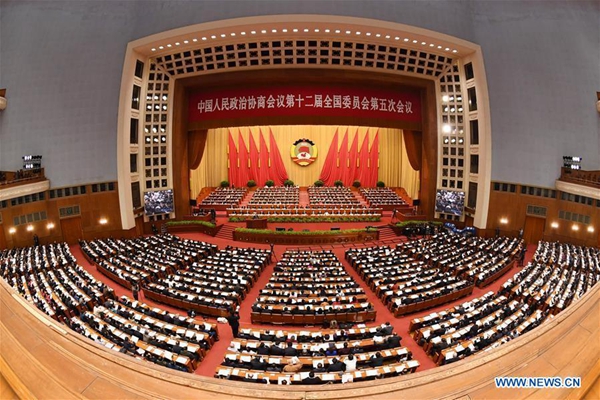China's model of democracy and pursuit of the common good
- By Elenoire Laudieri Di Biase
 0 Comment(s)
0 Comment(s) Print
Print E-mail China.org.cn, March 13, 2017
E-mail China.org.cn, March 13, 2017
|
|
|
The fourth plenary meeting of the fifth session of the 12th National Committee of the Chinese People's Political Consultative Conference is held at the Great Hall of the People in Beijing, capital of China, March 11, 2017. (Xinhua/Rao Aimin) |
The annual meeting of the Chinese People's Political Consultative Conference (CPPCC) recently held in Beijing and the concurrent National People's Congress (NPC) still under way have confirmed the climate of strong cohesion and common purpose marking China's political system under the leadership of the CPC Central Committee with General Secretary Xi Jinping as its core.
The meetings, commonly known as the "two sessions," are emblematic of China's own model of democracy bringing together from all over the nation some 5,000 participants -- politicians, public officials, scholars, professionals, scientists and experts of all kind -- to hear government reports and contribute ideas, propositions and opinions for policymaking at the national and international level.
The suggestion put forward by some Western commentators that all these people merely toe the party line and rubberstamp government determinations is misleading.
Over the last four decades China has abandoned an ideology-driven approach to government and developed a system that, though still based on one party, allows wide consultation process. Its model of democracy takes pragmatic developments as a fundamental goal. Policies are not driven by theories but pursuit of common good.
The CPPCC is unique to the Chinese political system and has three main functions -- providing expert advice, facilitating decision-making and giving voice to all sectors of the Chinese society. It essentially enables "multi-party cooperation" with eight, small, non-Communist parties that are not an opposition but are given the opportunity to be heard.
In other words, the CPPCC operates as a think tank putting forward ideas and proposals on political, economic, cultural, scientific and social affairs. Even if its recommendations are not binding, they exert a strong influence in the formulation of policies, as it contains some of the most sophisticated thinkers in their fields.
The NPC is China's parliament and votes on policy decisions. It oversees government operations and elects the members of the executive bodies. There is still the idea in the Western world that it mainly exists to give legal sanction to decisions already made at the highest levels of the government; instead, most bills are approved through intensive discussions.
There are many issues for which there is no consensus within the NPC and over which different parts of the party or government have different opinions. Although government bills often get a high affirmative vote, a great deal of legislative activity occurs in determining content. A major bill can take a long time to draft and sometimes will not go to a final vote if there is significant opposition to it.
A researcher with the Institute of China Studies at Fudan University suggests that "Chinese philosophy of governance includes two concepts -- "minyi" (the view of the people) and "minxin" (the hearts and minds of the people) -- which means that public opinion also has a crucial role in the decision-making process.
Quite fitting in this regard are the following passages from President Xi's enlightened speech at the Davos World Economic Forum last January:
"China follows a people-oriented development philosophy and is committed to bettering the lives of its people. Development is of the people, by the people and for the people. China pursues the goal of common prosperity.
"We have taken major steps to alleviate poverty and lifted over 700 million people out of poverty, and good progress is being made in our efforts to finish building a society of initial prosperity in all respects. [...] China has demonstrated its courage to take on difficult issues, navigate treacherous rapids and remove institutional hurdles standing in the way of development.
"These efforts have enabled us to unleash productivity and social vitality. Building on progress of 30-odd years of reform, we have introduced more than 1,200 reform measures over the past four years, injecting powerful impetus into China's development."
Democracy qualifies itself by the way it strives to produce benefit for all and China seems to be doing this better than the most Western democracies.
Elenoire Laudieri Di Biase (Twitter: @ElaudierLaudier ), a sinologist from the University of Ca' Foscari, Venice and Melbourne University, Australia, is an expert on international diplomacy and psychoanalysis. She is also Senior analyst on China at the NATO Defense College Foundation.
Opinion articles reflect the views of their authors only, not necessarily those of China.org.cn.






